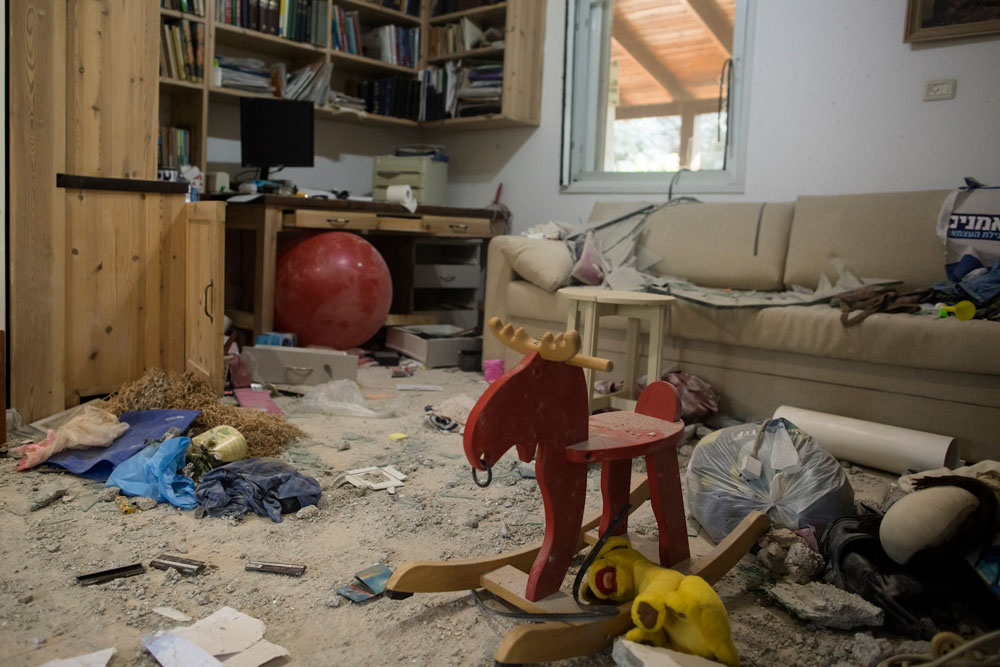
By Dov Waxman
In the wake of the Hamas terror attacks on Israel on Oct. 7, 2023, and the Israeli military response, Jewish people in Israel and around the world have, at times, been posting on social media or otherwise saying publicly that people who criticize Israel’s response are, or might be, antisemitic.
The Conversation U.S. asked Dov Waxman, director of the Y&S Nazarian Center for Israel Studies at the University of California, Los Angeles, to explain why many Jews might feel that way.
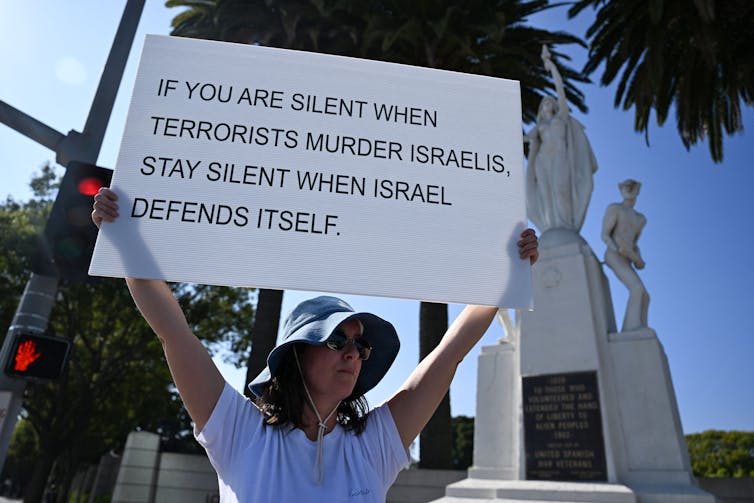
Robyn Beck/AFP via Getty Images
Why do some people appear to equate criticism of Israel with antisemitism?
There is a perception that many Jews have – including many Jews on the left who are themselves outspoken critics of Israel – that some of the responses, particularly on social media and on some college campuses, to what’s been taking place in Israel and Gaza have been callous and one-sided at best, and in some instances shockingly amoral. Some responses have celebrated Hamas’ attack, and others have solely blamed Israel for it. Still others have been silent about that attack and have only denounced Israel’s military response.
There’s a widespread feeling among Jews that these kind of reactions to the horrific atrocities perpetrated against Israeli civilians don’t reflect a commitment to universal values or human rights. Rather, they exonerate Hamas and treat the mass murder of Israeli civilians as somehow acceptable or legitimate. Some suspect that there’s a double-standard at play when people furiously condemn the killing of Palestinian civilians, but say nothing, or even excuse it, when Israeli civilians are killed.
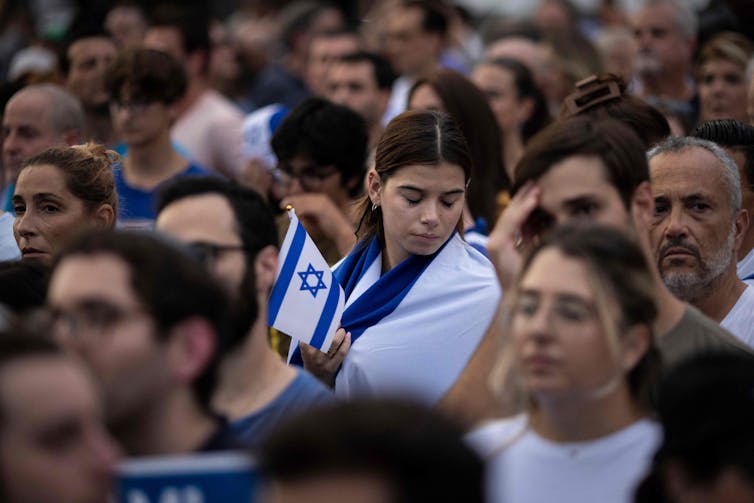
Marco Bello/AFP via Getty Images
What are Jewish people feeling and experiencing right now?
Many people who aren’t Jewish are responding as if what’s been taking place is just another episode of Israeli-Palestinian violence.
But it’s different for many Jews. My own Facebook feed is pretty much just pictures of Israelis who have been killed or are currently held captive in Gaza. Many Jews have friends and family in Israel, so it’s very personal for them.
Many Jews are still grieving, shocked and traumatized by what happened on Oct. 7. But other people, in the U.S. and around the world, have already moved on from Oct. 7, and they are much more concerned about the war that Israel is now waging against Hamas and the devastating impact it is having on Palestinians in the Gaza Strip.
Jews are often looking for what people have to say about the massacres of Israeli civilians. Most want to hear an unequivocal condemnation of what Hamas did. Any attempt to contextualize it is seen as somehow rationalizing or minimizing Hamas’ attack, or a failure to recognize that Hamas is not simply seeking a Palestinian state in the West Bank and Gaza, but the destruction of Israel.
And, on top of all this, Jews are becoming increasingly worried and fearful about being harassed or violently attacked by people blaming them for Israel’s actions, or just taking out their anger on them. There’s been a massive spike in antisemitic incidents in the United States and in many countries since Oct. 7.
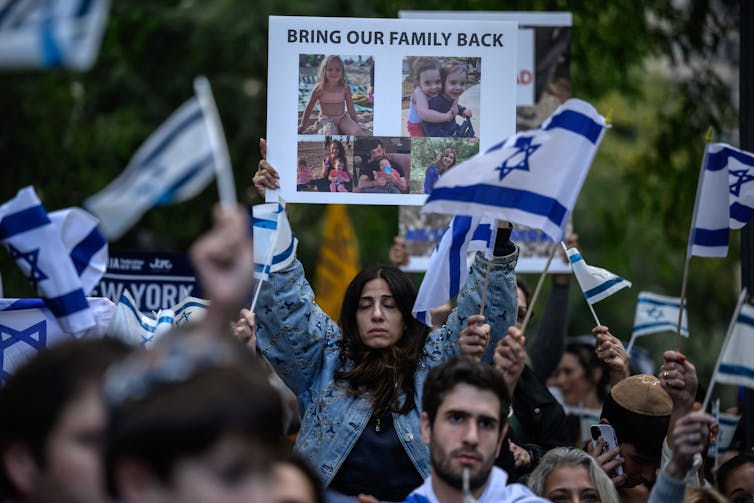
Ed Jones/AFP via Getty Images
What are the emotions behind this reaction?
For many Jews, the specific nature of Hamas’ attack – the mass slaughter and the way in which Hamas gunmen went systematically from house to house murdering families, and, in some cases, brutally butchering people – evokes deep, traumatic memories of the Holocaust.
What took place on Oct. 7 was the largest single-day killing of Jews since the Holocaust.
What many Jews see in Oct. 7, therefore, is not just a continuation of a long-standing conflict between Israel and the Palestinians. What happened on Oct. 7, in the minds of many, is qualitatively different.
The fact that many other people don’t seem to recognize or acknowledge that, or respond as many Jews would hope, is why some Jews feel that there’s antisemitism lurking beneath the surface – that Israeli Jews and Zionists in general have been so dehumanized and demonized that it’s become somehow acceptable for them to be killed, even if they’re civilians, including children and babies.
Is criticism of Israel actually antisemitic, or antisemitic under certain circumstances that people should learn to recognize or understand?
For a long time now, Israeli officials and some right-wing, pro-Israel organizations and activists have had the knee-jerk response that any criticism of Israel is antisemitic, and they strive to delegitimize critics of Israel by labeling them antisemites.
Unfortunately, legitimate criticism of Israel’s treatment of the Palestinians, and peaceful activism in support of the Palestinians, is too often called antisemitic.
I think that most Jews regard criticism of Israel as legitimate, though many feel that it is sometimes excessive. Many, if not most, Jews actually criticize Israel. Nobody seriously insists that all criticism of Israel is antisemitic. The real question is, what kinds of criticism of Israel are acceptable and what might be considered antisemitic? When does criticism of Israel cross the line into antisemitism?
Much of the mainstream American Jewish community, including many major organizations, draws the line between criticizing the actions and policies of Israeli governments – toward the Palestinians, for example – and criticizing Zionism or Israel’s identity as a Jewish state. They regard the latter as delegitimizing Israel, and they see that as antisemitic.
In my view, it’s not necessarily antisemitic to criticize Zionism or oppose Jewish statehood, but it’s certainly true that some opposition to Zionism and Israel’s existence as a Jewish state is motivated by antisemitism.
In general, criticism of Israel or of Zionism is not, in and of itself, antisemitic, even if they are very harsh and unfair criticisms. However, such criticism is antisemitic when it draws on antisemitic tropes, antisemitic stereotypes or antisemitic ideas.
People can often draw on those things inadvertently – they don’t necessarily know what an antisemitic trope or stereotype is. So, for example, there is an old antisemitic trope called the blood libel that dates back to the 11th century, claiming that Jews seek to kill Christian children to use their blood for ritual purposes. So when people say that Israel is deliberately killing Palestinian children, what some Jews are hearing is that Jews are once again being accused of wanting to kill children.
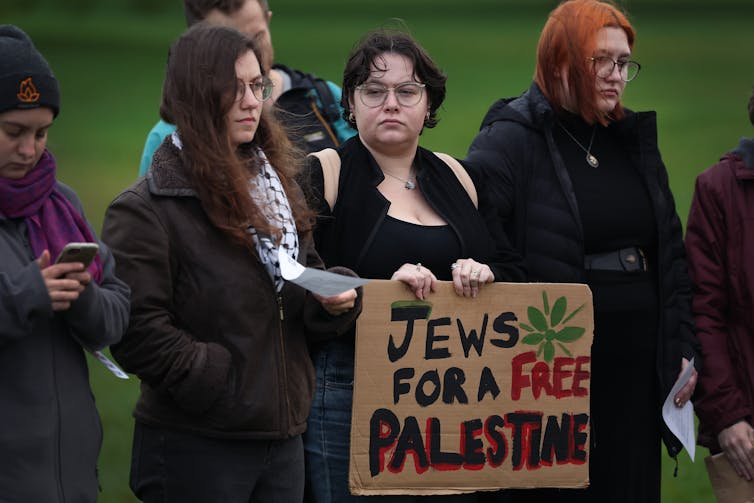
Scott Olson/Getty Images
After 9/11, some people criticized the U.S., not because it didn’t have the right to respond, but they criticized the nature of that response, whether it was appropriate, proportional and aimed at the right targets. Isn’t that what people are doing now regarding Israel’s response?
Yes, and just as we accept that it’s legitimate for people to criticize the U.S., it’s also legitimate for people to criticize Israel, or for that matter, any country.
But there is a difference in that nobody really challenges the existence of the United States, or says there should not be a United States of America. So when people criticize the U.S. or events in American history, they’re doing that in the context of an implicit assumption that the U.S. has a right to exist and will continue to exist.
Whereas in the case of Israel, its existence and legitimacy are still challenged. There are still many people who would rather there not be a state of Israel, at least not a Jewish state. So criticisms of Israel can take on a different character in that context.
In the case of Israel, there’s another important difference. Because of Jewish history, especially the Holocaust, there is an abiding sense of vulnerability that many Jews feel. And therefore there’s a worry about Israel’s existence and future, and ultimately the security of Jews, that I don’t think applies to the United States and Americans. Americans don’t have that existential fear.
This all boils down to a deeply traumatized group of people whose trauma was reactivated on Oct. 7 and in the harrowing days since. There’s this intergenerational, unhealed trauma from the history of antisemitism and the Holocaust, with Jews having been vilified, demonized and attacked for so long. That’s their collective memory. And it’s been powerfully evoked, even if not always consciously, over the past few weeks.
![]()
Dov Waxman is Rosalinde and Arthur Gilbert Foundation Professor of Israel Studies at the University of California, Los Angeles.





























JimboXYZ says
We live in a world where the human race piles on the reasons to justify what is going to go down. Just me, but I don’t think Israel has ever started one of these mini-wars ? It has always been Scud missiles & attacks on their side of a border that has instigated any attacks. Let’s not overthink the Gaza War at this point. Nobody cares about the reason(s) anymore. This is where that situation has escalated. Israel will pound the Gaza until they’re bored with the process of killing anything Hamas or Hezbollah. As long as they can sleep with themselves, that’s all that matters. Biden blessed it essentially.
ASF says
Equivalencies…If you judge the one sole majority Jewish nation on earth by standards that are uniquely different and more punishing than those you apply to all others, that is suggestive of Anti Semitism. In fact, that pretty much fulfills the operative definition of prejudice in general.
DaleL says
I find the statement: “In my view, it’s not necessarily antisemitic to criticize Zionism or oppose Jewish statehood,…” to be just plain false.
Zionism is not a new movement. It was begun in 1896. The concept behind it is that the Jewish people are not safe from extermination (genocide) anywhere in the world and thus need a country of their own. Because of the holocaust, there are still fewer Jews in the world than in 1939. Because of persecution, Jews have been forced to flee to Israel from Muslim controlled countries. Israel’s existence was mandated in the 1947 UN resolution dividing Palestine. In 1948, Israel declared independent statehood and was attacked by the armies of Egypt, Jordan, Syria, Iraq, and Lebanon. Every war in the region since then has been triggered by aggression and atrocities against Israel.
1950-1960s Fedayeen attacks. Arab guerrillas infiltrated from Syria, Egypt, and Jordan into Israel to murder civilians.
1956 Suez crisis: Egypt nationalized the Suez canal and blocked the Straits of Tiran, a critical waterway for Israel.
1967 Six day War: Egypt mobilized its military forces, ordered UN peace keepers to leave, and closed the Straits of Tiran. Jordan and Syria both entered the war against Israel.
1967-1970 War of Attrition: Egypt, USSR, Jordan, Syria, and PLO all participated and supported in harassing incursions into Israel.
1973 Yom Kippur War: Egypt and Syria launch full scale surprise attacks against Israel.
The list just goes on and on. The latest was the brutal attack on civilians last month by Hamas.
Sherry says
What a truly excellent article which recalls the extremely painful emotionally traumatic roots behind the perspective/attitude/response of the Jewish people world wide. It is important for each one of us to do our best to recognize the context and complexities of such heartbreaking tragedies. . . where there is clearly “NO Right” and “NO Wrong”.
As usual, jimbo can do nothing but mindlessly paste Fox talking points. This time, outrageous accusations of murdering people until bored. . . all in an effort to what? To insult our intelligence by thinking that we cannot see right through his continuous extremely elementary,cult driven, BS? Pathetic beyond words!